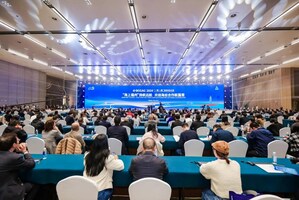The competition is overseen by the Chinese Wushu Association, with extensive support from Huanqiu.com. It is jointly organized by the Fuzhou Municipal Bureau of Culture and Tourism, the Fuzhou Municipal Bureau of Sports, and the Fujian Province Wing Chun Association. The Fuqing Municipal Bureau of Culture, Sports and Tourism, Fujian Traditional Wing Chun (Straits) Cultural Development Center, and the Southern Shaolin Temple in Fuqing are responsible for executing the event.
The Competition Attracts Global Participants, Showcasing International Appeal of Chinese Martial Arts
This year's event, spanning Asia, Europe, and the Americas, is held in three phases: the Primary Registration and Selection, the Intermediate Selection Contest, and the World Finals. The competition showcases a variety of Wing Chun skills, including Siu Nim Tao, Seeking the Bridge, and Thrusting Fingers. Competitors also battled in events such as the 8 Slashing Sword, Six and Half Point Long Pole, Wooden Dummy, and Chi Sao. With a total prize pool of nearly 250,000 yuan, the event offers awards in 43 different categories.
During the intermediate selection contest, numerous internationally recognized Wing Chun masters were present to observe and mentor the participants. Zujie Zheng, a national figure in Wing Chun, along with Shaorong Ye, Vice President of the Fujian Province Wing Chun Association, led exchanges involving Wing Chun culture across Europe, the Americas, and Asia. Hong Hai, Director of the China Cultural Center in Sofia, Bulgaria and Stanislav Bagalev, founder of the Bulgarian branch of the European WingTsun Organization, attended the local tournament. In Germany, Andreas Ertl, Founder and Managing Director of the European Wing Chun Association's Munich Academy, facilitated martial arts collaborations with Chinese practitioners. In the Netherlands, Zheng Wang, Director of the Chinese Cultural Center in The Hague, alongside Erik Batstra and Robert Vogel, instructors from the Wing-Chun Kung-Fu Association of the Netherlands, were key participants. Similarly, James Javidan, President of the French Shaolin Wing Chun Association, and Shisheng Xie, President of the French Chinese Wing Chun Association, provided guidance in Paris. In the United States, the tournament saw notable attendees such as Benny Meng, the National Director of the United States of America Wushu Kungfu Federation and an 8-Dan Grand Master certified by the International Wushu Federation, alongside Chango Noaks, a 7th level Senior Instructor certified by the Ving Tsun Athletic Association in Hong Kong and Vincent Meng, a certified Pan-American Wing Chun and Sanda referee.
During the contest, Kent R. Kernspechts, founder of the European WingTsun Organization and dubbed "the father of WingTsun in Europe," extended his congratulations. He remarked, "Chinese Kung Fu stems from Shaolin, and Chinese Wing Chun originates from Fuqing Southern Shaolin Temple, embodying the philosophical appeal of Zen and the spirit of martial arts."
Zheng Zujie and Wing Chun practitioners from several countries, engaged in cultural exchanges and discussions about Chinese martial arts techniques. At several venues, Zheng shared insights on topics such as "The Origin of Wing Chun - Fuqing Southern Shaolin, China," "The Shouzhong Way: Passed Down Through Generations," and "Martial Arts as a Form Celebrated Worldwide." His presentations highlighted the cultural roots and deeper meanings of Chinese Wing Chun, earning admiration from the many martial artists and enthusiasts who attended the events.
Wing Chun Martial Artists Compete, Building Global Friendships Through Martial Arts
Following the initial selection, nearly 1,000 contestants were selected to participate in the intermediate contest, creating an enthusiastic atmosphere at each competition site. Competitors, ranging from teenagers to middle-aged individuals, engaged in group duels, each aiming to secure their place in the World Finals. Participants from multiple countries showcased their exceptional skills in boxing, equipment handling, and hand-to-hand combat. The audience expressed their enthusiasm for the competition to become an annual event, providing a platform for more people to understand and learn Wing Chun.
Stanislav Bagalev, who served as the referee for the Bulgarian segment of the European competition, said in an interview: "It's an honor for Bulgaria to host the first stop of this intermediate contest. My visit to the Southern Shaolin Temple in Fuqing, China, in April for the launch ceremony was very impressive. I believe this competition will not only elevate the skill level of Wing Chun among participants from different countries but also enhance their mutual friendships."
Participant Asen Asenov expressed his excitement about visiting China, a dream realized through his engagement with Chinese martial arts. "I've been involved with Chinese martial arts for over 40 years, focusing exclusively on Wing Chun since 2006," Asenov shared. "Wing Chun is truly unique as it offers a distinctive experience that gives me boundless strength and confidence." Fourteen-year-old Nick Rye, who has been practicing Chinese martial arts since he was seven, also shared his thoughts with reporters: "Wing Chun has greatly contributed to my growth, providing me with a healthy body, a determined spirit, and a morally sound personality. I'm eager to visit the Southern Shaolin Temple in Fuqing to observe my fellow practitioners as they practice."
At the U.S. venue, Benny Meng brought a group of nearly 15 children and teenagers to observe the event. Over the years, Meng has devoted himself to the preservation and advancement of Wing Chun. He established the United States Wing Chun Museum and has focused on teaching Wing Chun and training youth. Meng emphasizes the integration of Zen and boxing while promoting a fun approach to learning, helping to spread Chinese martial arts culture. "Learning Wing Chun is incredibly beneficial for teenagers," Meng stated. "It aligns with the Chinese philosophy of 'Unity of Heaven and humanity,' which not only enhances Wing Chun techniques but also imparts significant life lessons."
Fuqing Southern Shaolin Temple: The Birthplace of Wing Chun, A Signature of Chinese Kung Fu
Shaolin culture, with its global perspective and spiritual values recognized universally, serves as a bridge connecting Eastern and Western civilizations. Based on archaeological excavations in the 1990s and numerous historical documents, the Southern Shaolin Temple in Fuqing, established during the Tang Dynasty's Zhenguan era, reached its zenith in the Song and Ming Dynasties, and has been known historically for its profound cultural heritage. Over thousands of years, the culture of the temple has evolved and spread, giving rise to the Zen, martial arts, and medical traditions that have exerted a broad and far-reaching influence both domestically and internationally.
Wing Chun, a traditional southern Chinese martial art, originated from the Fuqing Southern Shaolin Temple. Developed by Wu Mei, inspired by a Zen Master during the late Ming and early Qing dynasties, the martial art has since transcended its local roots. In 2014, Fuzhou's Wing Chun initiative gained recognition as a representative project of China's national intangible cultural heritage, showcasing its cultural significance. Deeply rooted in Chinese traditional martial arts culture, Wing Chun has become a popular and influential martial art worldwide.
Today, Wing Chun culture has spread globally, boasting over ten million practitioners. Serving as a living embodiment of outstanding Chinese heritage, it allows people worldwide to explore and appreciate the depth and splendor of Chinese martial arts.
The inaugural World Southern Shaolin Wing Chun Competition is more than just an international martial arts event; it provides a platform for Wing Chun enthusiasts globally to demonstrate their skills. By promoting the Southern Shaolin and Wing Chun cultures globally, this event aims to foster the creation of a traditional Chinese martial arts cultural IP. It also seeks to facilitate the spread of exceptional traditional Chinese culture and bolster international cultural exchanges and integration.
The global winners of the intermediate contest will gather at the Southern Shaolin Temple in Fuqing for the world finals. This event will not only showcase their skills but also foster friendships, promote cultural exchanges, and enhance interpersonal communications through martial arts.
SOURCE Huanqiu.com








Share this article